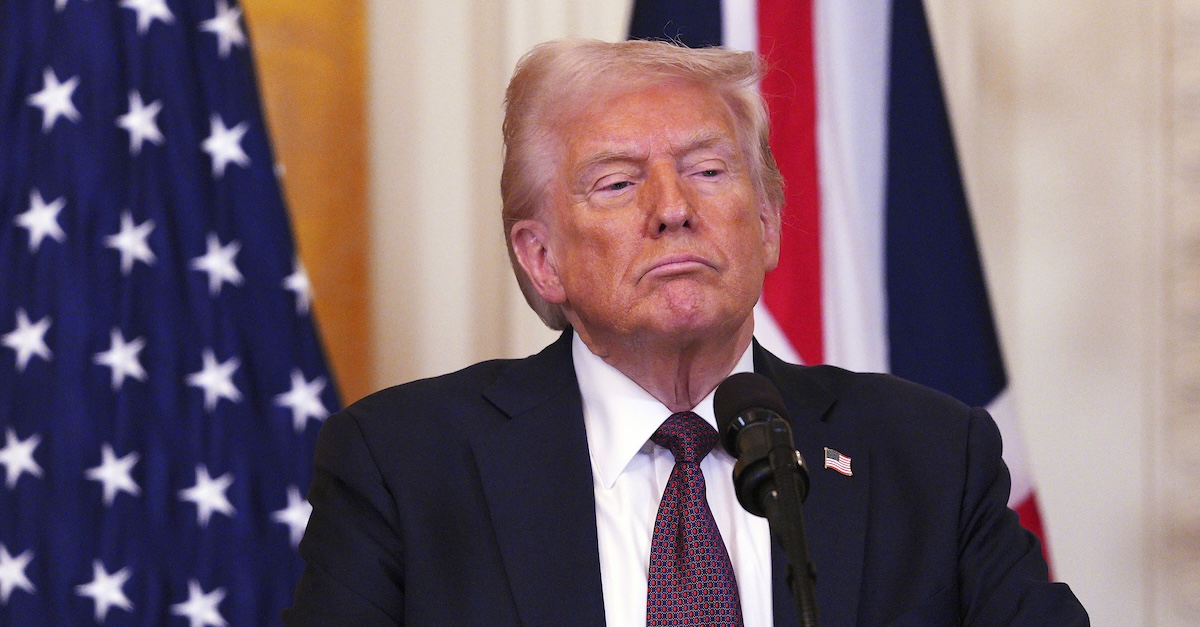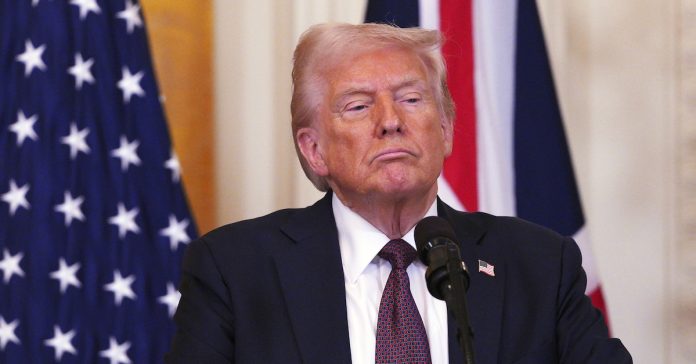
U.S. President Donald Trump speaks during a joint press conference with Britain’s Prime Minister Keir Starmer in the East Room at the White House Thursday, Feb. 27, 2025, in Washington (Carl Court/Pool Photo via AP).
A federal judge in Massachusetts halted key sections of President Donald Trump’s sweeping executive order purporting to unilaterally change the rules regarding how federal elections are run, finding that the plaintiffs in the case were “likely to succeed on the merits” to the president’s proposed reforms.
In a 44-page order, U.S. District Judge Denise J. Casper on Friday issued a preliminary injunction blocking the measure, which includes changes to the national voter registration form that would require documentary proof of U.S. citizenship and a provision prohibiting the counting of mail-in votes sent prior to Election Day but received afterward.
Casper states there is “no dispute” that only U.S. citizens are permitted to vote in federal elections, but reasons that Trump’s order usurps election rulemaking powers reserved for the legislative branch.
“The issue here is whether the President can require documentary proof of citizenship where the authority for election requirements is in the hands of Congress, its statutes do not require it, and the statutorily created EAC [Election Assistance Commission] is required to go through a notice and comment period and consult with the States before implementing any changes to the federal forms for voter registration,” the order states.
The court rejected the administration’s argument that the EAC “exercises executive power” and is therefore “subject to the administrative control of the President,” reasoning that such a position is “untethered from precedent and unsupported by even a maximalist view of ‘the executive Power’ under our Constitution.”
The judge, a Barack Obama appointee, added that the documentary proof of citizenship requirement “appears to be contrary to the will of Congress” and “creates procedural roadblocks” to participating in elections.
Casper also found that the states were likely to succeed on their challenge to the provision in Trump’s order that would require the head of each voter registration agency to assess citizenship prior even to providing federal voter registration forms to enrollees of public assistance agencies.
“Defendants cannot point to any source of authority for the President to impose this requirement on the States, particularly where the Elections Clause gives power over federal elections to Congress, and, in acting on that authority, Congress established the EAC to prescribe rules and regulations for elections and the NVRA [National Voter Registration Act] requires voter registration agencies, including all offices in the States that provide public assistance, to distribute the federal voter registration form,” the judge wrote.
There are currently 18 states that accept valid ballots received after Election Day.
Additionally, the court prohibited Trump from enforcing a provision in the order that would allow for criminal and civil action to be taken against states that count ballots sent before Election Day and received afterward. Casper wrote that there was “nothing in the text” of the statutes governing elections that prohibits states from “counting ballots received in accordance with their ballot receipt laws” and no law empowering the executive branch to punish states that do not enforce the president’s interpretation of the governing statutes.
“The Constitution does not grant the President any specific powers over elections,” Casper concluded.
The case challenging Trump’s executive order, “Preserving and Protecting the Integrity of American Elections,” was brought by 19 Democratic state attorneys general, including those in California, Massachusetts, Arizona, Colorado, Connecticut, Illinois, Michigan, New Jersey, New York, and Wisconsin.
In their complaint, the plaintiffs claimed that the president lacks the power to issue the challenged directives, claiming the executive order “usurps the States’ constitutional power and seeks to amend election law by fiat.”
Trump’s order is an apparent attempt to bolster the false claim that he won the 2020 presidential election. Since his loss that year to Joe Biden, Trump has repeatedly promulgated erroneous conspiracy theories positing that the election was rife with voter fraud and rigged in favor of Democrats.
“[T]he United States now fails to enforce basic and necessary election protections employed by modern, developed nations, as well as those still developing,” Trump’s directive stated. “Free, fair, and honest elections unmarred by fraud, errors, or suspicion are fundamental to maintaining our constitutional Republic. The right of American citizens to have their votes properly counted and tabulated, without illegal dilution, is vital to determining the rightful winner of an election.”
Trump has continued to promote that fictitious narrative even after he took office for the second time. For example, in April 2025, the president wrote on social media that the war between Russia and Ukraine “would never have happened if the 2020 Election had not been RIGGED, in other words, if I were President.”
A federal judge in Washington, D.C., in April similarly blocked several provisions of Trump’s executive order on election procedures from taking effect.

